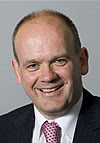
Monday was a day of London and transport debates, appropriate on the day of the second in Bob Crow's series of Autumn Tube strikes.
Boris at the Conference
The morning kicked off with a debate on transport and skills in the main hall. Two years ago a smaller chamber was used for most of the conference but this year there is increased demand so the larger Symphony Hall with its four tiers of seating is being used. Philip Hammond and Theresa Villiers announced transport policies including an extended commitment to build the new high speed railway beyond Birmingham, eventually aiming to connect Manchester and Leeds with London. The ministerial panel were also noticeably supportive when an audience member asked for measures to curb the power of the transport unions.
A session with Boris followed and the hall was predictably packed. Hordes of photographers descended on the front of the stage and I had to make do with my own pictures of Boris on the big screen above the stage, rather than the real thing. The great man began his speech with a condemnation of the politically motivated strikes which struck a chord with his audience. He then went on to make his case for defending spending on London's infrastructure, and it is to be hoped that George Osborne was listening from backstage.
No doubt mindful of the commuters struggling into work then returning home to watch his performance on the late news, Boris provided less of the usual humour in what was a hard hitting speech.
Motor Manufacturers and Traders Lunch
I don't usually do conference lunches, wishing to avoid the wrath of my personal trainer when I return to London, but I made this one exception this week. I found myself seated with representatives from Toyota, Honda and London Taxis International. The conversation focused on the development of electric cars and hybrid vehicles which they hoped would maintain our love affair with the car into the future, whilst hugely reducing the carbon footprint of motoring.
The development of plug in points for electric cars is likely to be a restraint on use in much the same way as a lack of filling stations limits the take up of alternative fuels. I suggested that electric cars could be charged at home, using the mains supply and it turns out that this solution is being considered. Range remains a problem for battery powered cars, but in London most journeys are over short distances, making them a good option for the capital.
The man from LTI told me that their vehicles are now being manufactured in China for use in their own cities. You can get a traditional black cab on the streets of Beijing.
London Reception
With Boris and his team returning to the city, I was left to speak to the London fringe meeting sponsored by Four Communications. I don't often get to step out of the 'shadow of Boris', and I took the opportunity to update delegates on the results of the strike which union leaders predicted would 'paralyse London':
40% of services ran as planned.
Only the Circle Line had no services.
The Hammersmith & City, Victoria, Waterloo & City and Northern Lines ran a full service.
DLR - with driverless trains - and buses were unaffected.
Boris Bike usage was up by 25%.
We were grateful to the volunteers who helped to run the underground and to the workers who defied their union bosses and turned up for work in greater numbers than during the previous strike, and we hoped the Mayor could find some way of rewarding their loyalty to London.










